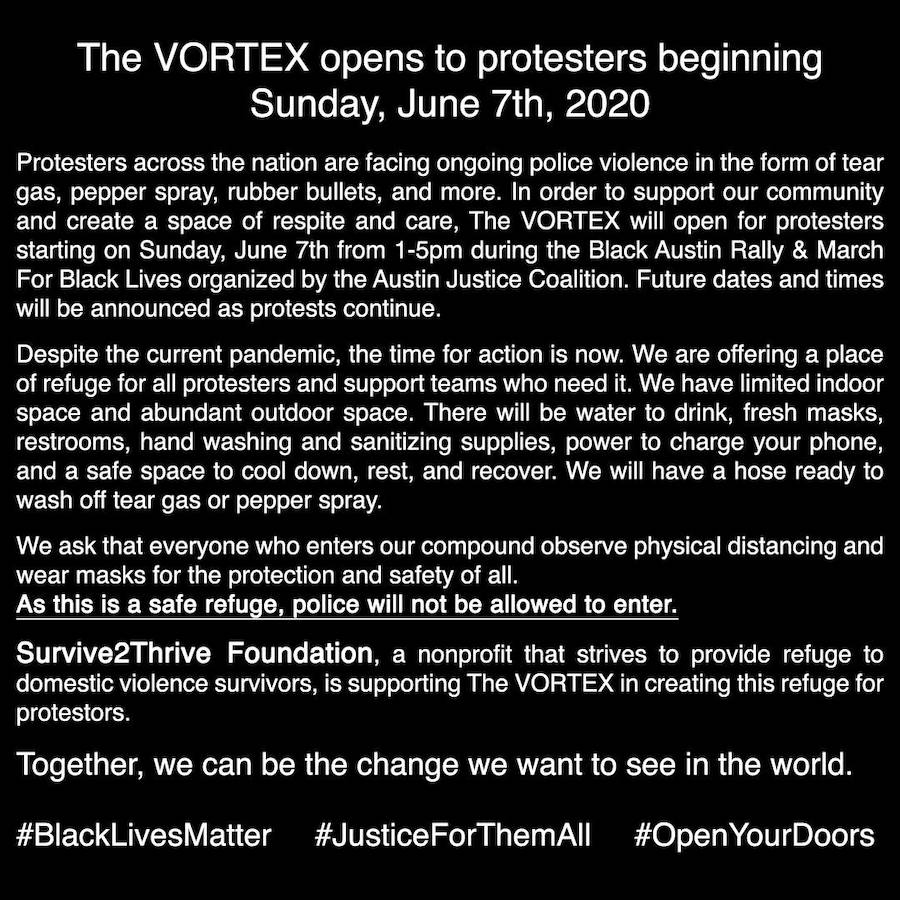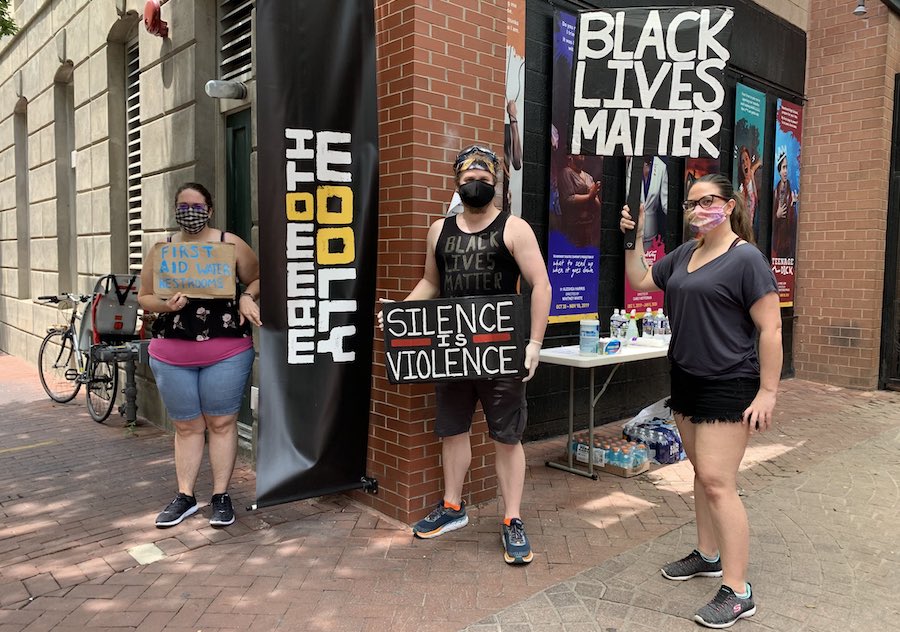Less than three months ago, theatre companies across the country turned off the lights and locked the doors as part of mandatory shutdowns to help stop the spread of COVID-19. Now companies are undergoing sanitization to welcome protesters flooding the streets in solidarity with the Black Lives Matter movement. Spurred by the killing of George Floyd and other long-standing inequities, protesters are rallying against systemic racism and police brutality—and now many are finding restrooms, WiFi, water, and respite from the heat at theatre companies.
On social media last week, the #OpenYourLobby hashtag gained momentum just as theatre companies released statements of solidarity. A growing number of theatre companies and arts organizations across the U.S.—83 as of June 8—are putting action behind their words, repurposing their lobby spaces as safe havens for protestors.
The Irondale Center in Brooklyn, New York, is a stone’s throw away from the Barclays Center, a gathering post for the Brooklyn protests. Last week, ensemble members Emilio Maxwell Cerci and Roni Sipp proposed the idea of opening up Irondale’s space to the growing crowds—and the ensemble unanimously decided to move ahead with the plan. Within just a few hours, the space was fully sanitized and the doors open.
“I’ve always talked about Irondale being a group of citizen-artists, and this shows that quality to the max,” says artistic director Terry Greiss, commending their efforts. “This is exactly what we should be doing…The world is changing, and we need to not only be part of it and aware of it, we need to help it go wherever it is going to go.”
Irondale’s year-round programing includes “To Protect, To Serve, To Understand,” a community program that brings together New York Police Department officers and civilians to connect and devise theatre together as a way to promote communication and empathy. Alumni of that program have been gathering on private Zoom calls this week to talk about the George Floyd protest. “It is so moving,” says Greiss, noting that he is deeply enmeshed with both police officers and civilians. Some of the calls were interrupted by police officers’ pleas for help over radio transmissions.
Irondale’s lobby is now open for protestors to rest, use WiFi, and access restrooms from noon to 7 p.m. A table of water and snacks is set up outside for passersby. Cerci and Sipp, who both live within walking distance of the theatre, have been spearheading the operations and are on-site.
Greiss has been heartened by the number of nearby Fort Greene residents who have donated resources and volunteered their time to help the company. “The whole Downtown Brooklyn Arts Alliance has been figuring out ways to support this movement and the change that needs to happen—and maybe out of all this crap something good will happen,” says Greiss. “My better angels say yes, it will.”
Greiss’s advice to other theatres thinking about opening their doors: “Don’t think too much about it, because you won’t do it,” he says with a laugh. “There are probably lots of bureaucratic obstacles one would find.”
To help clear some of those logistical hurdles, Woolly Mammoth Theatre Company in D.C. has been working with a community organizer on their efforts to reopen for protesters. The company has served as a gathering place for various events, namely as a hub for the Women’s March in 2017, but reopening amid a pandemic posed a need for greater safety measures.
“The decision to open happened very quickly, because we knew that we had to hold true to our values—and that meant creating a safe space for people to gather,” says Timmy Metzner, the director of marketing.
The company’s decision was guided in part by a call to action on social media. “We were nimble because of a call from our community,” says Metzner, noting that the theatre was asked to partake in the #OpenYourLobby initiative. “That’s what we want to be for the D.C. area—more than a theatre, we want to be a resource for people and provide what they need.”
Metzner credits the community organizer for getting the dormant theatre space ready quickly. “Those individuals know what they are doing—they can mobilize very quickly, they can give you the best practices to provide support and materials that are needed, and can help put out the call and amplify in ways that will signal boost the work,” says Metzner. The community organizer galvanized 60 volunteers and helped the company create a reopening strategy, which included a comprehensive plan of shifts and responsibility to ensure health and safety. This plan includes 10 volunteers per four-hour shift.
“We wanted to make sure that everyone was safe, not only the protesters, but our staff as well,” says Metzner. Woolly Mammoth’s sanitation process included a deep clean of the theatre, a plumbing check-up, and the placement of socially distant markers in the lobby space. The space will be routinely cleaned, and a team of volunteers—known as the Woolly Point People—are tasked with monitoring social distancing and making sure visitors are wearing masks.
In addition to offering a space to rest and recharge, the company is providing protestors with water, snacks, restrooms, and access to WiFi. “It was a very quick pivot, but the right one to make, for sure,” says Metzner.

In Texas, where the temperatures have been swelling to 100 degrees and coronavirus cases continue to rise, additional safety measures must be met. The VORTEX in Austin has opened its outdoor space for protesters to congregate and hydrate. Indoors, first aid kits and resources are available to quell heat exhaustion in the company’s blackbox space.
“We have been trying to do this in a thoughtful manner, and also a rapid manner, which has been a true challenge,” concedes managing director Melissa Vogt. The company was prepping for a soft reopening of its Butterfly Bar for limited outdoor seating on June 10. When peaceful protests turned violent the first week of June, the VORTEX pivoted its efforts to welcome protesters. “There is really a need for people to gather, recuperate, and wash off if they’ve been sprayed with pepper spray,” says Vogt, noting that the theatre has a hose and shower at the ready.
To help lessen exposure to the coronavirus, the theatre is limiting the number of volunteers on-site and assigns standby volunteers in case more are needed. Protesters are encouraged to stay in the theatre’s gated outdoor space. “We’re conscious of making sure we are not exposing people,” says Vogt.
They added volunteer and donation pages on the website, facilitating donations of water bottles, food, and masks. Despite the logistical challenges, the company is proud to be able to offer their space to protesters as a refuge.
“I’m just so happy that theatres across the nation are taking this action and really being active about their support for Black Lives Matter, not just making a statement,” says Vogt.




